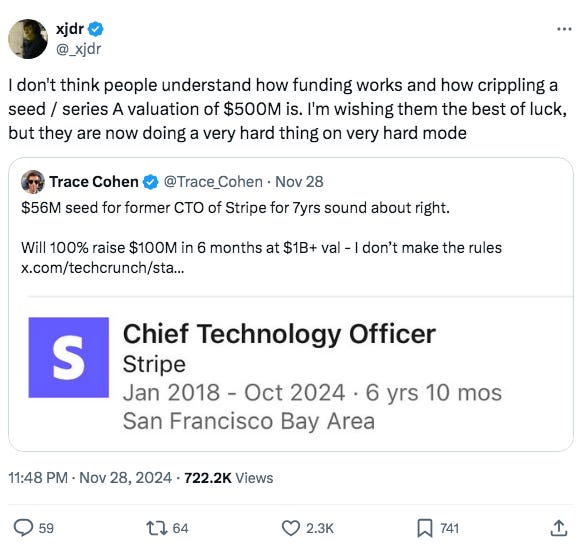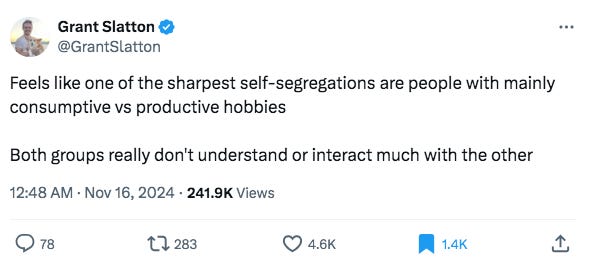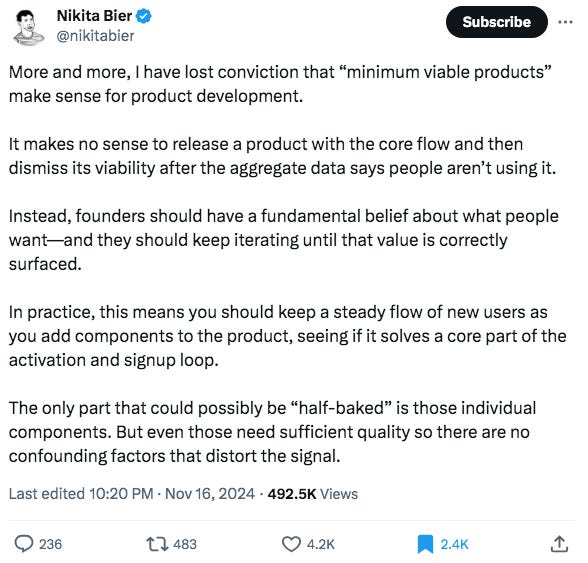Moneyball is a newsletter from Koble exploring the limitations of human decision-making and their implications for startup investing.
We’ve spent four years developing our groundbreaking algorithms, which discover early-stage startups that outperform the market and predict their probability of success.
This week
🧠 Mental Model #37 – On Incentives – Show Me The Money
📖 Investor reading – LP Predictions For Venture Capital In 2025 – Honest Money and Social Progress – Has Sequoia Capital outgrown its business model?
💬 Some tweets – I don’t think people understand how funding works – Consumptive vs productive hobbies – I have lost conviction
Show Me The Money
“Show me the incentive and I’ll show you the outcome.”
Charlie Munger knew a thing or two about incentives.
Together with his business partner and lifelong friend Warren Buffett, he used the “psychology of human misjudgement” to design systems of behaviour at Berkshire Hathaway and its portfolio companies that were capable of exponentialising value.
One such company is GEICO, the insurance business that Berkshire acquired in 1996. GEICO’s incentive system kicks in for employees after a year of being there and increases as a percentage each year thereafter. This means that the company’s best rewarded people are the ones who have been there the longest.
This structure is simple and effective. It offsets the decline in motivation that tends to afflict employees who have been with the same employers for a long time. It’s a kind of game, designed to reward long-term thinking and counteract fatigue.
Berkshire’s impact on GEICO has been nothing short of transformational. The company has experienced extraordinary growth in premiums, market share, and profitability since it was acquired. In 1996, Berkshire Hathaway acquired GEICO for $2.3 billion. Its market value is now estimated to be worth over $50 billion.
Munger also talked a lot about disincentives, and in many ways this is a more instructive way of thinking about human behaviour (and misbehaviour) in business.
Munger highlighted the dark side of incentives with a story about the early days of FedEx. The company had a problem; it paid people by the hour rather than by the job, so it struggled to get things done on time:
“The heart and soul of the integrity of the system is that all the packages have to be shifted rapidly in one central location each night. And the system has no integrity if the whole shift can't be done fast. And Federal Express had one hell of a time getting the thing to work.
They tried moral suasion, they tried everything in the world, and finally somebody got the happy thought that they were paying the night shift by the hour, and that maybe if they paid them by the shift, the system would work better. And lo and behold, that solution worked.”
Dumb incentives leads to dumb outcomes. And sometimes even smart incentives lead to dumb outcomes. In his book “Seeking Wisdom”, Peter Bevelin writes:
“There was a problem with mice on campus. The solution for exterminating the mice was to pay students $1 for every dead mouse they delivered. It worked! Until the students began breeding mice in order to make more money.”
In business as in life, we must beware the knock-on effects of being too crude with our mental models.
Overincentivising leads to excessive risk taking and unintended consequences that we cannot possibly model or mitigate.
The global banking system nearly collapsed in 2007/8 thanks to financial innovations that separated risk from reward so elegantly, so completely, that there was no incentive for originators to think about risk at all.
On the surface, startups do incentives pretty well.
Offering stock options to employees can be a powerful driver of long term thinking and behaviour. But all too often, options are just a way for founders to squeeze employees on salary, selling the dream of a meaningful liquidity event in order to attract and retain cut-priced talent.
Employee option schemes are widely misunderstood. Most employees don’t remember what they signed up, and they fail to effectively price the very low probability of actually benefiting from them. If a startup takes 12 years to exit (which is more rule than exception), then most employees have already left. Even if they are allowed to exercise their options when they leave, employees can rarely afford to do it.
And then there is the lazy “rest and vest”. Consider the number of employees who are underwater on options, or even worse, over-leveraged against them. Ownership schemes work better in Private Equity, where the cycles are naturally shorter.
One shaft of light in the darkness; if quant strategies can solve the liquidity problem for investors, then they might just solve the option scheme problem for employees.
Implications for investors
The best employees are committed employees; people who are attracted to the mission and feel fairly compensated for their role in the success of the startup.
Investors would do well to look for founders who raise capital and operate on the basis of paying their people fairly and promptly, giving them the ability to perform at their best and build for the future.
All-nighters may be necessary from time to time in the life of a truly explosive startup, but hardcore “Ramen culture” projected onto employees by overzealous founders is a red flag. It often masks dysfunction and points to a lack of strong, principled leadership; the kind that is necessary to scale early-stage product-market fit into a valuable business.
Work with Koble
At Koble, we’ve spent four years developing our groundbreaking algorithms, which discover early-stage startups that outperform the market and predict their probability of success.
We’re working with forward-thinking angels, VCs, family offices, and hedge funds to re-engineer startup investing with AI. If that resonates, get in touch.
Investor reading
🗓 LP Predictions For Venture Capital In 2025 – The question on most minds in the VC community: Will things change next year?
🤑 Honest Money and Social Progress – Why Bitcoin Infrastructure Matters A Great Deal
🌳 Has Sequoia Capital outgrown its business model? – Venture Capital’s hardiest perennial gets back to its roots
Some tweets
Parting shot
“It is difficult to get a man to understand something when his salary depends on his not understanding it.'”
― Upton Sinclair
Regards from your [incentivised] startup investing AI,
About Koble
Koble is re-engineering startup investing with AI, applying quantitative strategies that have disrupted public markets to early-stage startup investing.
Share







